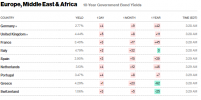Markets Upbeat with Global Risk Appetite Recovery
Global markets experienced a negative trend on the final trading day of the week due to developments in the Israel-Hamas conflict. Despite strong balance sheets, U.S. indices lost value, primarily due to increasing geopolitical risks. Major U.S. banks released their third-quarter financial reports, surpassing analyst expectations in terms of earnings per share and revenue.
Wells Fargo Company reported a 6.91% year-on-year increase in the third quarter of 2023, with earnings per share of $1.48 on revenue of $20.85 billion. The consensus expectation was for the company to announce earnings per share of $1.25 on revenue of $20.15 billion. Notably, the net profit exceeded expectations by 17.89%, reaching $5.45 billion. Also, Citigroup reported earnings of $1.63 per share on revenue of $20.1 billion. Consensus expectations were for the company to announce earnings per share of $1.22 on revenue of $19.24 billion. The net profit also exceeded expectations, showing a remarkable 40% increase to $3.50 billion.
On the macroeconomic front, consumer sentiment data published by Michigan for October came at 63, compared to an expected level of 67. Similarly, consumer expectations data was lower than anticipated, at 60.7 versus an expected 65.7. The one-year inflation forecast, which was expected to be 3.2% in line with previous data, was announced at 3.8%, while the five-year inflation forecast exceeded the 2.8% expectation, reaching 3%.
Today, in the United States, we'll also see the release of the Empire State Manufacturing Index and Budget Balance data. It's anticipated that the NY Fed index, which stood at -5.0 in October, will continue to decline. Regarding budget balance data, there's an expectation for a significant drop, potentially moving from $429.8 billion in August to a billion-dollar level. Additionally, the markets will be keeping a close eye on trade balance data in the Euro area.
Markets Upbeat with Global Risk Appetite Recovery
Global markets experienced a negative trend on the final trading day of the week due to developments in the Israel-Hamas conflict. Despite strong balance sheets, U.S. indices lost value, primarily due to increasing geopolitical risks. Major U.S. banks released their third-quarter financial reports, surpassing analyst expectations in terms of earnings per share and revenue.
Wells Fargo Company reported a 6.91% year-on-year increase in the third quarter of 2023, with earnings per share of $1.48 on revenue of $20.85 billion. The consensus expectation was for the company to announce earnings per share of $1.25 on revenue of $20.15 billion. Notably, the net profit exceeded expectations by 17.89%, reaching $5.45 billion. Also, Citigroup reported earnings of $1.63 per share on revenue of $20.1 billion. Consensus expectations were for the company to announce earnings per share of $1.22 on revenue of $19.24 billion. The net profit also exceeded expectations, showing a remarkable 40% increase to $3.50 billion.
On the macroeconomic front, consumer sentiment data published by Michigan for October came at 63, compared to an expected level of 67. Similarly, consumer expectations data was lower than anticipated, at 60.7 versus an expected 65.7. The one-year inflation forecast, which was expected to be 3.2% in line with previous data, was announced at 3.8%, while the five-year inflation forecast exceeded the 2.8% expectation, reaching 3%.
Today, in the United States, we'll also see the release of the Empire State Manufacturing Index and Budget Balance data. It's anticipated that the NY Fed index, which stood at -5.0 in October, will continue to decline. Regarding budget balance data, there's an expectation for a significant drop, potentially moving from $429.8 billion in August to a billion-dollar level. Additionally, the markets will be keeping a close eye on trade balance data in the Euro area.
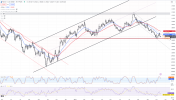
The week begins with the EUR/USD pair showing a positive start and bouncing back from Friday's decline to reach levels slightly below the key psychological threshold of 1.0500. Now, it appears that the pair has broken a two-day trend of losses. However, during the International Monetary Fund's annual meeting, ECB President Christine Lagarde noted over the weekend that economic growth could slow down if the impact of monetary policy turns out to be more significant than expected or if the global economy weakens further and geopolitical risks escalate. This serves as a reminder for EUR/USD bulls to exercise caution.
Today, the parity is hovering around 1.0535 level. On the upside, the parity could encounter resistance at the 1.0565 level. If that level is broken, we will follow 1.0610 as a firmer resistance. On the downside, it could push the pair down to around 1.0495, and then possibly to October’s lowest level 1.0450.
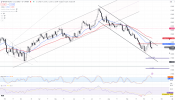
GBP/USD pair is maintaining a favorable position, hovering around 1.2160, benefitting from the recent weakness of the US dollar. Bank of England (BoE) Governor Andrew Bailey has indicated that interest rates are likely to stay in the vicinity of the current 5.25% level to bring inflation back to the target of 2%. Meanwhile, investors have already factored in the possibility of a rate hike by the Federal Reserve (Fed) before the year concludes. As we move forward, market participants will closely watch the release of UK employment data and US Retail Sales figures scheduled for Tuesday.
Today, there's a possibility that the GBP could surpass 1.2250 and test 1.2295 level, but it's unlikely to reach the major resistance at 1.2395. Support levels are at 1.2160 and then 1.2035.
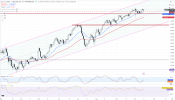
The US Dollar (USD) had been doing well recently after the US Consumer Price Index (CPI) report, but now it's not so strong at the beginning of the week. This is affecting the USD/JPY pair. Some Federal Reserve (FED) officials have suggested that the FED might delay raising interest rates in November because treasury bond yields have gone up a lot, making it harder for people to borrow money. Because of this, people who like to buy USD are being careful, and this is making it tough for the USD/JPY pair. Additionally, there's talk that Japan might step in to help its currency (the Japanese Yen or JPY) from getting too weak. But on the other hand, the Bank of Japan (BoJ) is taking a careful approach and not planning to reduce its big financial support. This helps support the USD/JPY pair because it means people are less worried about Japan's currency getting weaker.
The pair is hovering around 149.55 level and still 148.75 level (21-Daily Simple Moving Average) could act as a support. If that level is broken, we are following 148.15 level. On the upside, 149.80/85 region is still as a resistance, next 150.15 level.
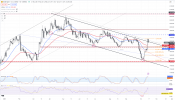 The price of gold (XAU/USD) reached a three-week high of approximately $1,932-$1,933 on Friday. This surge was attributed to the escalating Israel-Hamas conflict, causing investors to seek shelter in traditional safe-haven assets. Further, the belief that the Federal Reserve (Fed) is approaching the end of its interest rate increases further contributed to the rise in the value of gold, a non-yielding asset.
The price of gold (XAU/USD) reached a three-week high of approximately $1,932-$1,933 on Friday. This surge was attributed to the escalating Israel-Hamas conflict, causing investors to seek shelter in traditional safe-haven assets. Further, the belief that the Federal Reserve (Fed) is approaching the end of its interest rate increases further contributed to the rise in the value of gold, a non-yielding asset.
Today, gold price is trading around $1911 and technically $910-12 area (200-day exponential moving average) is followed as the first support. Then, the next support level will be 1900/1903 region. On the upside, the bull buyers wait for the $1932-33 region and then the momentum will increase till the $1948 level.
Global markets experienced a negative trend on the final trading day of the week due to developments in the Israel-Hamas conflict. Despite strong balance sheets, U.S. indices lost value, primarily due to increasing geopolitical risks. Major U.S. banks released their third-quarter financial reports, surpassing analyst expectations in terms of earnings per share and revenue.
Wells Fargo Company reported a 6.91% year-on-year increase in the third quarter of 2023, with earnings per share of $1.48 on revenue of $20.85 billion. The consensus expectation was for the company to announce earnings per share of $1.25 on revenue of $20.15 billion. Notably, the net profit exceeded expectations by 17.89%, reaching $5.45 billion. Also, Citigroup reported earnings of $1.63 per share on revenue of $20.1 billion. Consensus expectations were for the company to announce earnings per share of $1.22 on revenue of $19.24 billion. The net profit also exceeded expectations, showing a remarkable 40% increase to $3.50 billion.
On the macroeconomic front, consumer sentiment data published by Michigan for October came at 63, compared to an expected level of 67. Similarly, consumer expectations data was lower than anticipated, at 60.7 versus an expected 65.7. The one-year inflation forecast, which was expected to be 3.2% in line with previous data, was announced at 3.8%, while the five-year inflation forecast exceeded the 2.8% expectation, reaching 3%.
Today, in the United States, we'll also see the release of the Empire State Manufacturing Index and Budget Balance data. It's anticipated that the NY Fed index, which stood at -5.0 in October, will continue to decline. Regarding budget balance data, there's an expectation for a significant drop, potentially moving from $429.8 billion in August to a billion-dollar level. Additionally, the markets will be keeping a close eye on trade balance data in the Euro area.
Post automatically merged:
Markets Upbeat with Global Risk Appetite Recovery
Global markets experienced a negative trend on the final trading day of the week due to developments in the Israel-Hamas conflict. Despite strong balance sheets, U.S. indices lost value, primarily due to increasing geopolitical risks. Major U.S. banks released their third-quarter financial reports, surpassing analyst expectations in terms of earnings per share and revenue.
Wells Fargo Company reported a 6.91% year-on-year increase in the third quarter of 2023, with earnings per share of $1.48 on revenue of $20.85 billion. The consensus expectation was for the company to announce earnings per share of $1.25 on revenue of $20.15 billion. Notably, the net profit exceeded expectations by 17.89%, reaching $5.45 billion. Also, Citigroup reported earnings of $1.63 per share on revenue of $20.1 billion. Consensus expectations were for the company to announce earnings per share of $1.22 on revenue of $19.24 billion. The net profit also exceeded expectations, showing a remarkable 40% increase to $3.50 billion.
On the macroeconomic front, consumer sentiment data published by Michigan for October came at 63, compared to an expected level of 67. Similarly, consumer expectations data was lower than anticipated, at 60.7 versus an expected 65.7. The one-year inflation forecast, which was expected to be 3.2% in line with previous data, was announced at 3.8%, while the five-year inflation forecast exceeded the 2.8% expectation, reaching 3%.
Today, in the United States, we'll also see the release of the Empire State Manufacturing Index and Budget Balance data. It's anticipated that the NY Fed index, which stood at -5.0 in October, will continue to decline. Regarding budget balance data, there's an expectation for a significant drop, potentially moving from $429.8 billion in August to a billion-dollar level. Additionally, the markets will be keeping a close eye on trade balance data in the Euro area.

The week begins with the EUR/USD pair showing a positive start and bouncing back from Friday's decline to reach levels slightly below the key psychological threshold of 1.0500. Now, it appears that the pair has broken a two-day trend of losses. However, during the International Monetary Fund's annual meeting, ECB President Christine Lagarde noted over the weekend that economic growth could slow down if the impact of monetary policy turns out to be more significant than expected or if the global economy weakens further and geopolitical risks escalate. This serves as a reminder for EUR/USD bulls to exercise caution.
Today, the parity is hovering around 1.0535 level. On the upside, the parity could encounter resistance at the 1.0565 level. If that level is broken, we will follow 1.0610 as a firmer resistance. On the downside, it could push the pair down to around 1.0495, and then possibly to October’s lowest level 1.0450.
| Resistance 3 | Resistance 2 | Resistance 1 | Support 1 | Support 2 | Support 3 |
| 1.0690 | 1.0610 | 1.0565 | 1.0495 | 1.0450 | 1.0425 |

GBP/USD pair is maintaining a favorable position, hovering around 1.2160, benefitting from the recent weakness of the US dollar. Bank of England (BoE) Governor Andrew Bailey has indicated that interest rates are likely to stay in the vicinity of the current 5.25% level to bring inflation back to the target of 2%. Meanwhile, investors have already factored in the possibility of a rate hike by the Federal Reserve (Fed) before the year concludes. As we move forward, market participants will closely watch the release of UK employment data and US Retail Sales figures scheduled for Tuesday.
Today, there's a possibility that the GBP could surpass 1.2250 and test 1.2295 level, but it's unlikely to reach the major resistance at 1.2395. Support levels are at 1.2160 and then 1.2035.
| Resistance 3 | Resistance 2 | Resistance 1 | Support 1 | Support 2 | Support 3 |
| 1.2395 | 1.2295 | 1.2250 | 1.2160 | 1.2035 | 1.1900 |

The US Dollar (USD) had been doing well recently after the US Consumer Price Index (CPI) report, but now it's not so strong at the beginning of the week. This is affecting the USD/JPY pair. Some Federal Reserve (FED) officials have suggested that the FED might delay raising interest rates in November because treasury bond yields have gone up a lot, making it harder for people to borrow money. Because of this, people who like to buy USD are being careful, and this is making it tough for the USD/JPY pair. Additionally, there's talk that Japan might step in to help its currency (the Japanese Yen or JPY) from getting too weak. But on the other hand, the Bank of Japan (BoJ) is taking a careful approach and not planning to reduce its big financial support. This helps support the USD/JPY pair because it means people are less worried about Japan's currency getting weaker.
The pair is hovering around 149.55 level and still 148.75 level (21-Daily Simple Moving Average) could act as a support. If that level is broken, we are following 148.15 level. On the upside, 149.80/85 region is still as a resistance, next 150.15 level.
| Resistance 3 | Resistance 2 | Resistance 1 | Support 1 | Support 2 | Support 3 |
| 152.15 | 150.15 | 149.85 | 148.75 | 148.15 | 147.15 |
 The price of gold (XAU/USD) reached a three-week high of approximately $1,932-$1,933 on Friday. This surge was attributed to the escalating Israel-Hamas conflict, causing investors to seek shelter in traditional safe-haven assets. Further, the belief that the Federal Reserve (Fed) is approaching the end of its interest rate increases further contributed to the rise in the value of gold, a non-yielding asset.
The price of gold (XAU/USD) reached a three-week high of approximately $1,932-$1,933 on Friday. This surge was attributed to the escalating Israel-Hamas conflict, causing investors to seek shelter in traditional safe-haven assets. Further, the belief that the Federal Reserve (Fed) is approaching the end of its interest rate increases further contributed to the rise in the value of gold, a non-yielding asset. Today, gold price is trading around $1911 and technically $910-12 area (200-day exponential moving average) is followed as the first support. Then, the next support level will be 1900/1903 region. On the upside, the bull buyers wait for the $1932-33 region and then the momentum will increase till the $1948 level.
| Resistance 3 | Resistance 2 | Resistance 1 | Support 1 | Support 2 | Support 3 |
| 1948 | 1932 | 1923 | 1903 | 1885 | 1869 |


